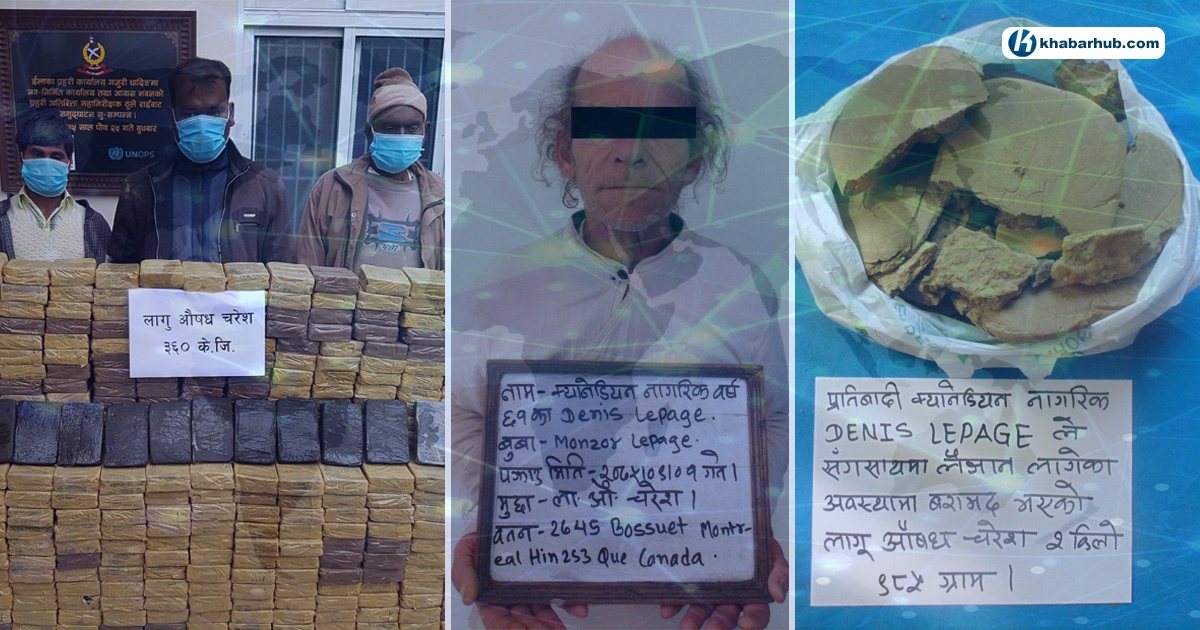0%
Drug trafficking has been a major income source for purchasing weapons which are used in the war-torn countries such as Afghanistan, Pakistan, Iraq, Yemen, African countries Libya, Sudan, Somalia, Mali, and Congo.

KATHMANDU: Drug trafficking, its consumption, and production, which have been the most serious issue across the world, have not spared Nepal, too.
It has been the most challenging task to crack down on the internationally organized network of drug traffickers across the world despite efforts made by law enforcing agencies.
Police have been keeping a close tab on drug-trafficking and have been arresting drug traffickers. However, the number of incidents has gone up in an unprecedented manner.
On December 16, Nepal Police arrested a Canadian national Denis Lapage with 2.985 kilograms of hashish at the Tribhuvan International Airport (TIA).
Drug trafficking has been a major income source for purchasing weapons which are used in the war-torn countries such as Afghanistan, Pakistan, Iraq, Yemen, African countries Libya, Sudan, Somalia, Mali, and Congo.
According to DIG Dinesh Amatya, spokesperson of Narcotic Control Bureau (NCB), the 61-year-old Denis was arrested during a security check possessing the drug while he was about to board a flight to Thailand.
This was only the tip of the iceberg.
According to the records maintained by the Nepal Police Headquarters, a total of 741 people, mostly Indian nationals, were arrested in the period of five years –2013 to 2018. Other include nationals from 33 countries such as Pakistan, China, Malaysia, Bolivia, Poland, Turkey, Russia, Canada, and Brazil.
Drug trafficking has been a major income source for purchasing weapons which are used in the war-torn countries such as Afghanistan, Pakistan, Iraq, Yemen, African countries Libya, Sudan, Somalia, Mali, and Congo.
Details of foreigners held
According to the information provided by the Nepal Police Headquarters, and NCB, as many as 152 foreigners have been held in 2014 for trafficking drugs via the route of Nepal. Similarly, 124 were arrested in 2015, 139 in 2016, and 159 in 2017. Similarly, in 2018, as many as 167 foreigners were arrested, police informed. Some of those arrested are women.
Nepal turning into a drug trafficking transit point
Analysts have said that drug traffickers chose Nepal as a transit point for trafficking drugs taking advantage of its weak security system. A large amount of drug is trafficked to India and vice versa through the Nepal-India open border checkpoints. Brown sugar, heroin, and cocaine are brought to Nepal from India while marijuana, hashish, and opium are supplied to India from Nepal.
Similarly, cocaine is produced in South American countries such as Bolivia, Colombia, and Peru. Cocaine is supplied targeting affluent countries since it is very expensive.
Most of the drugs manufactured in South Asia come to Nepal via India before they are trafficked to Europe and America from Kathmandu.
Where and who manufactures drugs?
Narcotic drugs especially, opium and heroin are manufactured in Afghanistan, Pakistan, and Iran. Similarly, they are also produced on the border areas of Thailand, Burma, and Vietnam, including some parts of Nepal.
Heroin is the major income source for carrying out terrorist activities in the war-torn countries across the world, said former AIG Debendra Subedi.
Similarly, cocaine is produced in South American countries such as Bolivia, Colombia, and Peru. Cocaine is supplied targeting affluent countries since it is very expensive.
Drugs, which are used in Nepal include white heroin, raw brown sugar, marijuana, hashish among others.
Drug-trafficking has multi-faceted ramifications
Drug consumption, production, and trafficking have been the most serious problem in the world, of late.
According to former AIG Subedi, the drug is not only an addiction but has multi-faceted problems.
The income made through drug trafficking is used to promote the culture of corruption, terrorism, and crimes. It is also used to exert pressure on the government, power politics among others.